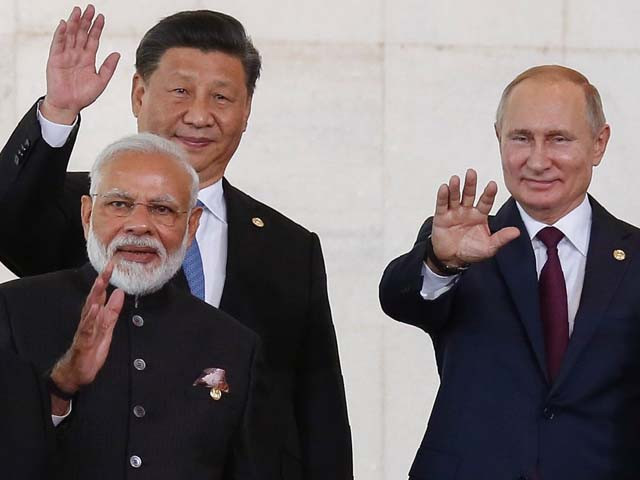India’s The Sunday Guardian (TSG) published a piece on Russian-Indian relations over the weekend headlined “Unreasonable hope misplaced in India-Russia ties”. The title misleadingly conveys the sense that hoping for the improvement of bilateral relations between these two historic partners is “unreasonable” and “misplaced”, but the substance of the text expresses a more balanced view. The author, Maneesh Pandeya, frames everything through the perspective of what he describes as “over-enthusiastic analysts” who “foresee New Delhi getting into Moscow’s strategic plans” following Russia’s hosting of talks last week between his country and China on the sidelines of the SCO meeting.
The journalist makes it clear that he disagrees with these unnamed experts’ take on the situation before proceeding to share the assessment of three analysts on this larger topic. In the order in which their views are first presented, these are: Professor Deepa M. Ollapally, Associate Director at the Sigur Center for Asian Studies at George Washington University; Aparna Pande, Asia expert and program director at the Hudson Institute; and Michael Kugelman, deputy director of the Wilson Center’s Asia Program. Their views are mixed, but for the most part, they accurately reflect the real state of affairs in Russian-Indian relations, with several notable exceptions.
All three experts are correct in concluding that Russia will continue to balance between India and China in pursuit of its interests. They point out how Moscow has nothing to gain by sacrificing its excellent relations with New Delhi and Beijing, especially since few countries can boast of enjoying such ties between these two rival nations. The topic of emerging fault lines in the Russian-Chinese relationship, however, is where I begin to disagree with some of their views. Ollapally is right when she says that there’s some worry in Russia over the Belt & Road Initiative (BRI), which I elaborated upon in a recent analysis asking “Is Russia Backtracking On BRI?” She’s also correct in highlighting the influence of economic factors on Russia’s strategic calculus in this respect.
Where I disagree with Ollapally is when she says that “it’s not in Russia’s own interest to build up China’s defence capabilities without limits.” That’s a valid point in theory, but in practice, there’s no realistic scenario of China becoming a conventional military threat to Russia. The two neighbors have resolved their previous border differences and cooperate real closely on military-technical issues, with Moscow even helping Beijing create a missile-attack warning system. Importantly, the Stockholm International Peace Research Institute (SIPRI) noted in their March 2019 report on “Trends In International Arms Transfers” from 2014-2018 that China was Russia’s second-largest arms market at 14% of its sales while Russia supplied 70% of Chinese military imports.
I therefore dispute Pande’s claim that these two countries “still have border disputes” since no such disputes presently exist. As for Kugelman’s analysis, he accurately ascertained the balancing role that India and Russia play for one another vis-a-vis their respective partnerships with the US and China. I would just add that they might go even further with their balancing act, which I wrote about in an academic article that I co-authored earlier this year in the official journal of the Moscow State Institute of International Relations (MGIMO, run by the Russian Foreign Ministry) about “The Prospects of Russia and India Jointly Leading a New Non Aligned Movement”. I argue that this plan would optimise their mutual balancing potential in the New Cold War.
Where Kugelman and I don’t see eye to eye is on the future of Russian-Chinese relations in the context of the West’s efforts to contain the latter. He asks, “Why would Russia want to go in the same direction as a global bloc with which it is at odds, and alienate its relations with the world’s next superpower?”, and my answer to him is contained in last week’s analysis that I published titled “Is Russia ‘Abandoning’ Or ‘Recalibrating’ Its ‘Balancing’ Act Between China & India?” My main point is that “Moscow is nevertheless ‘passively facilitating’ New Delhi’s vanguard role [in containing China] in order to leverage this for the purpose of ‘restoring equality’ in its strategic relations with Beijing...(and) reviving its stalled ‘New Detente’ with the West”.
As proof of this, I pointed out in the piece how Russia’s official decision not to sell arms to Pakistan out of respect for India’s security interests makes one wonder why it continues to sell weapons to India despite its supposed respect for China’s security interests, thus suggesting a hierarchy of interests between them. Russia’s approval of India’s Quad membership, albeit with the hope that the group becomes “more inclusive” and “based on the principle of indivisible security” is also a strong signal to China. Lastly, the official confirmation that the two plan to agree to a military logistics pact later this year will strengthen India’s naval influence in the Far East with the consequence of more patrols to and fro that location via the South and East China Seas.
Pande understands the reason why this is happening. She assessed that “while Russia may not challenge it openly, (this) does not mean that Russia would accept a China-centred world”. It’s taboo for many to talk about since such an idea has been hyped up by over-enthusiastic analysts across the Atlantic to the point where those elsewhere across the world who discuss this observation are smeared as parroting American wishful thinking, but Russia really does seem to feel uncomfortable with the scenario of a “China-centred world”. This explains why it’s presently recalibrating its relations with China by vigorously moving towards India so much over the past year ever since the most recent Putin-Modi meeting in Vladivostok last September.
Regardless of Russia’s intentions, this developing state of affairs arguably advances American strategic interests in Eurasia, though the experts differ over the extent to which it’ll help repair Moscow’s relations with Washington. Pande and Kugelman are much more pessimistic than Ollapally, the latter of whom predicted that “If Trump wins a second term, he might dial things down with Russia. This is more likely than dialling it down with China which has now taken a life of its own. Improved relations with the US will put Moscow in a better bargaining position vis-a-vis China.” I agree with Ollapally and elaborated more on the reason why in my April 2018 analysis for the Oriental Review online journal about “What The US Really Wants From Russia”.
To summarise my views, the most sober-minded American strategists understand the impossibility of repeating the Old Cold War’s Sino-Russo split in the New Cold War, yet they also understand that Moscow will naturally balance Beijing for the reasons that The Sunday Guardian’s experts noted. This creates an opportunity to exacerbate their differences by creating incentives such as vague promises of sanctions relief and/or a reduced NATO presence along Russia’s western periphery to convince Moscow to distance itself from Beijing, especially when it comes to BRI. To be clear, Russia wouldn’t be “selling out” in this scenario, but just taking its balancing act to the next level by using the West to improve its leverage with China just like it presently uses India.
I also concur with Ollapally and Kugelamn’s shared conclusion that what Pandeya describes as this “dream scenario” and “dream bloc” would be a “nightmare scenario for Beijing”, one in which “we’d see US-China rivalry reaching troubling new levels.” Wrapping everything up, it appears as though this “dream scenario/bloc” is what Pandeya had in mind when he headlined his article in such a pessimistic way by criticising what he regards as the “Unreasonable hope misplaced in India-Russia ties”. Whether he meant to or not, my belief is that he constructed a strawman argument -- perhaps for clickbait purposes -- that he then proceeded to systematically dismantle by quoting the three discussed experts’ assessments on related topics.
Despite being a loud and very proud critic of India, my assessment of the evolving grand strategic dynamics of the New Cold War is that it’s Pandeya’s title that’s “unreasonable” and “misplaced”, with all due respect to the author. Indian-Russian relations are enjoying a renaissance last seen nearly half a century ago during the 1970s. They’ve overcome most of their prior differences of the last few years and seem to share the same concerns vis-a-vis China, albeit expressed differently, which has acted as the real driver behind this development. Even though both of them might still dislike the other’s relations with their respective rivals (Russian dislike of Indian-US ties, Indian dislike of Russian-Chinese and Russian-Pakistani ones), they nevertheless accept them.
This observation opens up the possibility for perfecting Russia’s balancing act between India and China by continuing its fast-moving rapprochement with Pakistan. I elaborated more on this idea in my mid-May analysis about how “Improved Russian-Pakistani Relations Will Help Moscow Balance The New Bipolarity”. A few weeks later, the prestigious Russian International Affairs Council (RIAC) think tank republished an academic article that I co-authored elsewhere about “Pakistan’s Role In Russia’s Greater Eurasian Partnership”. The relevant gist of these two pieces is that improved Russian-Pakistani relations enable Moscow to maintain trust with Beijing via its “iron brother” despite moving closer towards New Delhi, which also keeps India’s pro-American pivot in check to an extent by reminding it that Russia always has other regional options in the worst-case scenario.
There’s more to those complementary analyses than just that, which is why I strongly encourage readers to at least skim through them if they have the time. I referenced them at the end of my review in order to point the way forward for Russia’s balancing act after it appears to been unbalanced by none other than its own hand. I wrote last November that “Improved Russian-Indian Ties Must Be Balanced With Improved Russian-Chinese Ones”, but no such symmetric improvement has accompanied Moscow’s observable tilt towards New Delhi since then, hence the need for the asymmetric solution of improving Russian-Pakistani relations to this effect instead. It remains to be seen whether Russia will implement this strategy or not, but it’s my sincere hope that this review will generate a much-needed discussion among many about why it should.



COMMENTS
Comments are moderated and generally will be posted if they are on-topic and not abusive.
For more information, please see our Comments FAQ